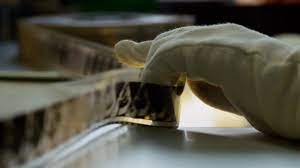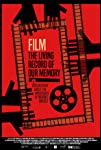Eye For Film >> Movies >> Film, The Living Record Of Our Memory (2021) Film Review
Film, The Living Record Of Our Memory
Reviewed by: Sunil Chauhan

If you’ve recently seen Lawrence Of Arabia, Wim Wenders’ The Goalie's Anxiety At The Penalty Kick or Satyajit Ray’s Pather Panchali, chances are that you saw a modern restoration. In much the same way that a good restoration will cause you to see an old film anew, Inés Toharia’s documentary will make you consider the restoration process with fresh eyes.
A deep dive into the world of film archives and individual archivists, this film tracks the history of film preservation from its nascent stages, when the very notion was thought frivolous, to the present day when organisations like the BFI maintain vast facilities lined by row upon row of film cannisters. The archivist’s gift and ambition – to unearth lost treasures to expand the film canon and uncover obscure histories - is highlighted by glimpses of recent prize discoveries, such as Mother Dao and directors like Albert Samama Chikli and Germaine Dulac (any hungry film fan will want to set about hunting them down).
But beyond that investigative desire, there’s what Patricio Guzman describes as archive film’s ability to bear witness to history, to provide an account of events forgotten or purposely written out of history and the collective memory. The archivist’s job then moves beyond simply preserving studio staples or film-art landmarks to mine the reels of home videos, industrial, educational and underground archives. Here – as footage of Japanese internment camps or shops in Nazi Germany revealed – can lie alternate histories. As you watch Film, The Living Record of our Memory, simply contemplating the vastness of all the materials lying within the archives scattered around the globe can be staggering.
Though its main contributions come from archivists working in America and Europe, credit is due to Toharia for expanding the scope of voices to Asia, Latin America and Africa, the latter of which receives the most in-depth attention of archives outside the west. These contributions highlight the disparity in available resources for archivists outside western cities where on top of thin political, financial or cultural support, creating the cooler conditions that film demands to survive can be that much tougher. Working in buildings without dependable energy needed to regulate temperature, preservation can be a battle. Restoring is a luxury.
As Toharia explores the odd conundrum whereby digitally shot films are stored on film (digital storage has a short shelf life) while digital tools better allow for celluloid to be restored, Film, The Living Record hints at the cost of preserving ever-increasing mountains of material as the film world, still lamenting all the work lost in its early decades, frets about how screen content created and distributed digitally might be held for future generations.
It acknowledges that in an era of greater awareness than ever of our environmental footprint, the need for archiving and the cause for preservation might need to be reframed and freshly justified – is the energy required to power and cool all those digital servers really necessary to ensure all of Adam Sandler’s Netflix comedies are never lost to the ravages of history?
A quote from Barbara Hammer (“Nothing that has ever happened should be lost to history”) can be safely assumed to be observed with reverence by all here. Yet while the job of the archivist is to remind of what might be or has been lost but ideally shouldn’t be, perhaps the unreliable, finite lives of film stock and digital storage suggest that loss is a natural part of creation, whether human life or the moving image. That might be a debate for a different documentary however. What Toharia has assembled here is a vigorous, energising account of those providing a valuable cinematic service.
Reviewed on: 25 Nov 2021
















